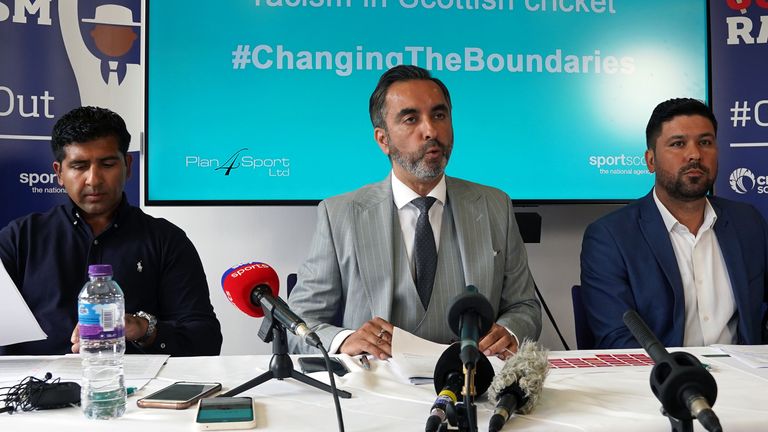Cricket Scotland has appointed two new board members as it tries to turn its reputation around after a damning report found it to be institutionally racist.
The sporting body was plunged into special measures earlier this year when it failed 29 out of 31 indicators of institutional racism and only partially passed the other two – with its entire board quitting and two ex-players telling of their ordeal while they were in the Scotland team.
But, on Friday, Cricket Scotland announced governance expert Anne-Marie Garner and inclusion specialist Ajit Trivedi would join the board as the body tries to salvage its reputation.
Anjan Luthra, the new chairman of Cricket Scotland, described their appointments as “hugely important” but said it was “only the start of a longer-term process”.
“Their appointments represent a major step forward in terms of creating a skilled and truly diverse board that will forge a new future for our sport,” he said.
Cricket Scotland was put into special measures in July after the damning report by consultancy Plan4Sport, which revealed 448 indicators of institutional racism.
Louise Tideswell, Plan4Sport managing director, said it was clear that the “governance and leadership practices of Cricket Scotland have been institutionally racist”.
Last month, national sports agency Sportscotland said Cricket Scotland had made progress since the report but “genuine cultural change” within the game was needed.
Mr Luthra said that the “review into racism in our sport was clear and we need to start properly addressing the issues we face”.
And Mr Trivedi said: “There can be no place for racism in Scottish cricket. The next few months will be key to rebuilding the sport and I am confident that if we all pull together, we change the game for the better.”
Ms Garner said that she believed “cricket can become the most welcoming and diverse sport in Scotland” and added: “This has been a challenging time for the sport but we have a huge opportunity to put that right and we must now follow through and tackle the problems we face including racism.”
In July, on the eve of the publication of the damning report, Cricket Scotland’s entire board quit, and issued an apology to those who had suffered racism and discrimination within the sport.
Qasim Sheikh told he first suffered racism racism within the sport when he was 15 years old, and that racism seemed “to get brushed under the carpet”.
“Playing for the national team was everything I dreamed of, however, I don’t feel I was treated equally,” he said, and added how he was referred to as “you lot” because of his race.
And his counterpart, Majid Haq, told of the discrimination he experienced while in Scottish cricket, and said because of his race he had to “play twice as well as a white player to stand a chance” and his treatment not only upset himself but his friends and family.
Aamer Anwar, the solicitor for the pair, described the Plan4Sport report as the “most devastating verdict to be delivered on any sporting institution in the United Kingdom”.
The two former players met with Cricket Scotland’s chief executive, Gordon Arthur, earlier this month to express concerns that progress into reforming the governing body had been too slow.
But Mr Haq said he felt “rare optimism” about the future of his sport after the appointment of Anjan Luthra as board chairman.
“He is young, very ambitious and has done a lot in his life already. He comes from a good family, has good morals, and is extremely competitive and will want the best,” he said.
“He will aim for the top and that’s what we need in Scottish cricket because there is a lot of potential there.”




